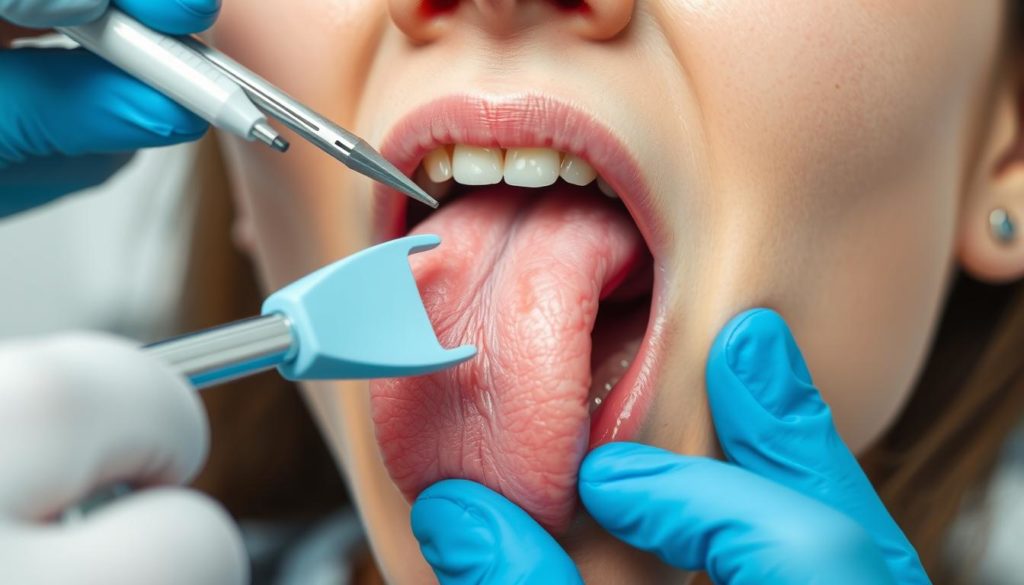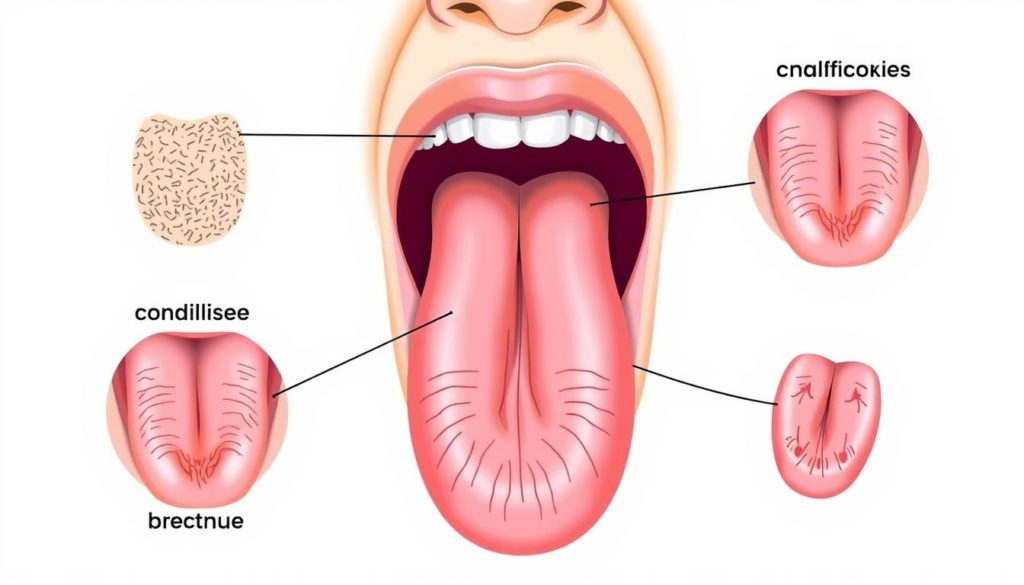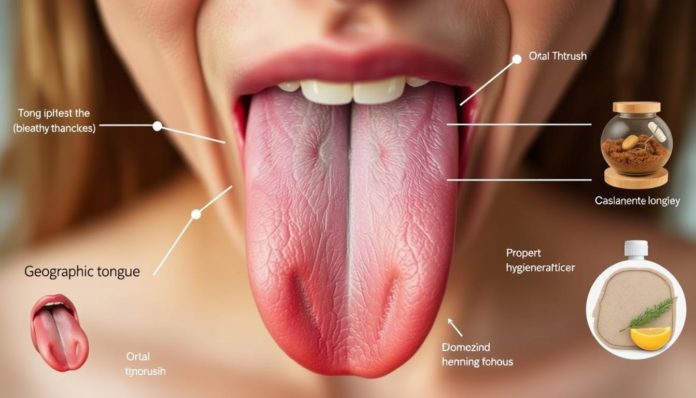Did you know more than 30% of adults face tongue issues in their lives? The tongue’s health is key to good oral hygiene. Knowing about tongue health can spot early trouble signs.
The tongue might look small, but it shows big health clues. Learning about tongue health is crucial for your wellness. It involves spotting abnormalities and keeping your mouth clean.
We’ll cover tongue health basics here. You’ll learn about different problems and why early action is important. If you see color changes, feel discomfort, or notice texture issues, understanding these signs can help keep your mouth healthy.
Why Tongue Health Matters
The state of your tongue can tell you a lot about your health. A quick tongue examination can catch health issues early. This makes it a vital part of your health care routine. By spotting signs and symptoms on your tongue, you can look after your tongue and overall health.
Importance of Regular Tongue Examination
Looking at your tongue regularly is key to finding health problems early. Changes in its color, texture, or moisture can show different health issues. For example, a white coating might mean oral thrush, and a red, swollen tongue could mean you lack vitamins. Watching these signs can help you get care fast.

Impact on Overall Health
Your tongue shows clues about your tongue and overall health. Problems like a dry tongue could mean your body needs more water. This could affect your whole body. Also, infections or sores on the tongue could signal bigger health issues. This would need a full check-up by a doctor.
Connection to Digestive and Oral Health
A healthy tongue is a sign of good digestive health. Its look can reflect how well your digestive system works. A coat or swelling could suggest digestive issues. Since the mouth is the start of the digestive tract, tongue care also helps digestive health. So, caring for your tongue helps your digestion too.
Common Tongue Conditions
Learning about tongue conditions is very useful for spotting tongue issues quickly. We will discuss common conditions like Geographic Tongue, Black Hairy Tongue, Canker Sores, and Oral Thrush. This will give you detailed info on their symptoms and what causes them.

Geographic Tongue
Geographic Tongue looks like map patterns on the tongue. These spots can move and change shape, especially with stress or sickness. Although it’s mostly not serious, seeing a doctor is wise if it bothers you.
Black Hairy Tongue
With Black Hairy Tongue, the tongue looks dark and furry. This scary-looking condition is usually not dangerous. Good mouth care, like brushing your tongue, can prevent it.
Canker Sores
Canker Sores are small, hurting ulcers on the tongue or mouth’s soft parts. They come from stress, small mouth injuries, or some foods. Using mouth pain relievers and avoiding spicy foods can ease pain and speed up healing.
Oral Thrush
Oral Thrush shows up as white patches in the mouth and on the tongue. It can make eating painful and needs treatment with fungus-fighting medicine to clear up.
| Tongue Condition | Symptoms | Potential Causes |
|---|---|---|
| Geographic Tongue | Map-like patches on the tongue | Stress, Illness |
| Black Hairy Tongue | Dark, hairy appearance | Poor oral hygiene |
| Canker Sores | Painful ulcers | Stress, Minor Injuries, Certain Foods |
| Oral Thrush | Creamy white lesions | Overgrowth of Candida fungus |
Signs and Symptoms of Tongue Problems
It’s vital to know the signs of tongue problems for good oral health. Various signs can point to conditions needing care.
Visible Changes in Color and Texture
Early signs include changes in tongue color and texture. A healthy tongue looks pink with tiny bumps. Yet, a white coat, red patches, or a shiny surface are not normal.
Discomfort and Pain Indicators
Pain or discomfort in the tongue is a red flag. This might feel like burning, soreness, or sharp pain. It can make everyday tasks hard.
Difficulty in Eating and Speaking
Problems like pain or swelling can affect eating and speaking. This can disrupt chewing and speech, harming nutrition and how we communicate. Such issues can greatly lower life quality.
Causes of Tongue Disorders
Tongue problems can start from different reasons. One big reason is from our genes. This means our family’s health history can make us more likely to have these issues. Also, the way we live plays a big part. Things like smoking and drinking too much alcohol can hurt our tongue.
Medicines we take can also cause problems for our tongue. Some drugs might lead to a dry mouth or fungal infections. And, the air we breathe and things around us, like pollution and allergens, can harm our tongue too.
Health conditions are another big cause. Diseases like diabetes or problems with our immune system can show up as tongue problems. Not having enough of the right vitamins and minerals can also cause trouble for our tongue.
- Genetic Predispositions: These include inherited traits that increase susceptibility.
- Lifestyle Choices: Habits such as smoking and excessive drinking.
- Medication Side Effects: Impacts from certain drugs.
- Environmental Factors: Exposure to pollutants and allergens.
- Underlying Health Conditions: Related health problems like diabetes.
- Nutritional Deficiencies: Lack of vital nutrients impacting tongue health.
| Cause | Description |
|---|---|
| Genetic Predispositions | Inherited traits that increase the risk of tongue disorders. |
| Lifestyle Choices | Habits such as smoking and alcohol consumption that can lead to tongue problems. |
| Medication Side Effects | Adverse effects from certain medications that impact tongue health. |
| Environmental Factors | Exposure to pollutants and allergens that trigger tongue issues. |
| Underlying Health Conditions | Health conditions like diabetes that can manifest as tongue disorders. |
| Nutritional Deficiencies | Lack of essential vitamins and minerals affecting the tongue. |
Diagnosing Tongue Problems
Understanding tongue problems starts with a correct diagnosis. If you have ongoing or serious symptoms, it’s important to know when to get help. This part will help you see when you need a professional. It will also tell you about the tests to expect and why your medical history matters a lot in tongue diagnosis.
When to See a Doctor
If you notice any of these signs, it’s time to see a doctor:
- Persistent color changes or lesions
- Pain more than just discomfort
- Trouble eating or speaking for more than two weeks
- Not getting better with regular mouth care
Diagnostic Procedures
To figure out tongue problems, doctors do several things. Each step is key to find the root cause:
- Physical Examination: Looking closely can show obvious issues.
- Swab Tests: These find infections caused by bacteria, viruses, or fungi.
- Biopsy: In serious cases, a small tissue sample is checked.
- Blood Tests: These can uncover other health issues that affect the tongue.
Importance of Medical History
Your medical history is very important for tongue diagnosis. It gives clues about your past health, issues you’ve had before, and your meds. These can all impact your tongue’s health. It’s important for patients to give detailed info about:
| Factor | Details to Provide |
|---|---|
| Medical Conditions | Details of illnesses like diabetes or autoimmune diseases |
| Current Medications | All prescriptions and over-the-counter drugs you’re taking |
| Lifestyle Habits | Your smoking, drinking, and eating habits |
| Past Oral Issues | Any tongue or mouth problems you’ve had before |
Getting the right diagnosis means noticing symptoms and understanding them with your medical history. Seeing a doctor at the right time can make treatments work better.
How to Maintain Good Tongue Health
A healthy tongue is key for oral hygiene. It looks better and fights oral diseases. Below, find tips to keep your tongue healthy.
Daily Cleaning Practices
Clean your tongue daily to stay healthy. Use a tongue scraper or soft toothbrush each morning. It removes food bits and bacteria, fighting bad breath and other issues.
Importance of Hydration
Staying hydrated is vital for a healthy tongue. Drink water all day to keep your mouth moist. It helps wash away food and reduces bacteria.
Diet and Nutrient Considerations
Your diet affects your tongue’s health. Eat foods rich in vitamins and minerals. Leafy greens and lean meats, full of B12 and iron, are great for your tongue. Cut down on sugary and acidic foods to avoid sores and infections.
- Practicing regular tongue cleaning
- Staying adequately hydrated to maintain moisture
- Eating a nutrient-rich diet
Treatments for Common Tongue Issues
Fixing tongue issues involves a mix of products, home cures, and sometimes doctor visits. It’s vital to know these to pick what’s best for you.
Over-the-Counter Remedies
For small tongue issues, over-the-counter solutions work well. They are easy to find and cheap, helping with sores, geographic tongue, and mild thrush.
- Antiseptic Mouthwashes: Products like Listerine can help reduce bacteria in the mouth and soothe irritation.
- Topical Gels: Medications such as Orajel offer direct relief by numbing the affected area.
- Antifungal Rinses: For mild oral thrush, rinses containing antifungal agents like nystatin are particularly effective.
Home Remedies
Many choose home remedies for tongue problems for their natural and low-cost benefits. Here are a few popular options:
- Saltwater Rinses: Gargling with warm saltwater can heal minor tongue wounds and lower swelling.
- Honey: With antibacterial qualities, honey on a sore or swollen area can speed up healing.
- Baking Soda: A paste of baking soda and water helps canker sores and cuts mouth acidity.
Medical Treatments
For serious or ongoing tongue problems, a doctor’s help may be needed. Seeing a healthcare pro guarantees you get the right help.
Common medical treatment for tongue issues includes:
| Treatment Type | Conditions Treated | Description |
|---|---|---|
| Prescription Antifungals | Oral Thrush | Medications like fluconazole are prescribed for stubborn fungal infections. |
| Topical Corticosteroids | Canker Sores | These help to reduce inflammation and pain associated with severe canker sores. |
| Laser Therapy | Persistent Ulcers | A modern approach to treating stubborn mouth ulcers and speeding up healing. |
Remember, talk to a pro before starting any tongue treatment to make sure it’s safe and right for you.
Preventive Tips for Avoiding Tongue Problems
It’s key to keep your tongue healthy for your overall well-being. Although often overlooked, preventing tongue problems prevents discomfort later. Here, we’ll share some tongue health tips to steer clear of common problems.
Start with great oral hygiene. Brush your teeth twice daily, floss, and use a tongue scraper. These steps fend off bacteria and prevent tongue issues. Also, drink lots of water to keep your mouth hydrated and clean.
Nutrition affects your tongue’s health too. Eat foods rich in vitamins and minerals. Focus on vitamin B complex and iron to avoid problems. Cut down on sugary snacks and drinks to prevent oral thrush.
Quick tips include:
- Brush and floss regularly
- Use a tongue scraper daily
- Stay hydrated
- Eat a balanced diet
- Limit sugary foods and drinks
Getting regular dental check-ups is also smart. They can spot issues early, before they worsen. Don’t wait for pain to see an expert.
By following these tongue health tips, you can actively keep your tongue problem-free and ensure good oral health.
Here’s a handy table of preventive tactics:
| Practice | Action |
|---|---|
| Brushing | Twice daily |
| Flossing | Once daily |
| Tongue scraping | Daily |
| Hydration | 8+ glasses of water/day |
| Balanced diet | Rich in vitamins/minerals |
| Routine check-ups | Biannually with a dentist |
Tongue Problem Basics: What You Need to Know
Tongue health is key to your overall well-being. This article shows why checking your tongue is important. Looking at your tongue’s color, texture, and any pain helps spot health issues early.
Conditions like Geographic Tongue, Black Hairy Tongue, and Canker Sores are common. We also talked about Oral Thrush, its causes, and symptoms. Doctors use specific tests to find what’s wrong, and knowing your health history helps them.
Keeping your tongue healthy means cleaning it daily, drinking enough water, and eating right. For minor problems, over-the-counter or home remedies work well. Following these tips can prevent tongue issues, improving your mouth’s health.
FAQ
What are some common tongue conditions I should be aware of?
Be on the lookout for conditions like Geographic Tongue, Black Hairy Tongue, Canker Sores, and Oral Thrush. They have unique symptoms and can impact your mouth’s health.
Why is it important to regularly examine my tongue?
Checking your tongue often can reveal changes in its color or texture. Spotting these changes early helps prevent bigger health problems.
How can tongue health impact my overall health?
Your tongue’s condition can show signs of general health issues, including problems with your digestion and mouth. Tongue troubles might point to larger health concerns.
What are the causes of most tongue disorders?
Tongue problems can stem from genetics, lifestyle, environment, or medication side effects. Other health issues may also play a role.
When should I see a doctor about tongue problems?
See a doctor if changes to your tongue last, cause pain, or make it hard to eat or talk. A healthcare professional can diagnose the issue correctly.
What are some effective daily practices to maintain good tongue health?
Keeping your tongue clean, staying hydrated, and eating nutrient-rich foods are key. These actions help keep your tongue in top shape and avoid disorders.
Are there over-the-counter and home remedies for tongue issues?
Yes, you can find relief with over-the-counter products or home remedies like saltwater rinses. But if issues persist, see a healthcare professional.
How can I prevent tongue problems from occurring in the first place?
Prevent issues by practicing good oral hygiene, eating well, avoiding tobacco, and protecting your mouth from injury. Also, don’t skip dental check-ups.
Why is understanding the basics of tongue problems important?
Knowing the basics aids in spotting and treating tongue issues early. Being informed helps you take steps to maintain your tongue and overall health.


